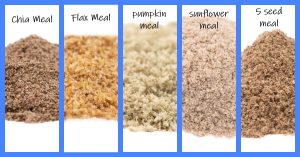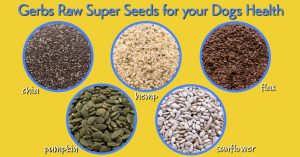No need to wake up the house to grind our seeds, all the hard work is done for you by Gerbs! Whether big (pumpkin and sunflower), small (hemp hearts, chia, flax) or grain-like (quinoa, millet amaranth), seeds supply an extra buzz of protein, along with fiber, amino acids, fats, vitamins, minerals and other useful micro-nutrition morsels. You can add them as an ingredient in your dog’s home-cooked meals or sprinkle them on as a topper.
In order for your fluffy friend to benefit most from super seeds, they need to be ground fresh and should be refrigerated and stored in an air tight container to avoid rancidity. Our lines of seed meals are ground at cold temperatures at high speeds, with full oil content. Gerbs seed meals are protein packed & calorie-rich, use them judiciously. Finally, try a single variety at a time in small quantities until you know how your dog responds to and tolerates them.
Quinoa and amaranth are “ancient grains,” seeds from plants that have been cultivated the same way for thousands of years. Amaranth contains all nine amino acids, making it a complete protein.
Chia and flax Seeds are best refrigerated. Chia is said to be an immune-system booster and is credited with supporting dogs’ electrolyte balance. Flax is high in fiber, and both are high in anti-inflammatory.
Hemp seeds are a high-protein, easily digestible source of immune-system support.
Pumpkin and sunflower seeds supply extra anti-oxidants. Pumpkin seeds rank high in zinc, a mineral recommended for dogs with copper toxicosis, aka copper storage disease. (Sunflower seeds, on the other hand, are high in copper, so if your dog has liver problems, check with your vet before feeding.) Pumpkin seeds are unusual in that their nutritive value has been shown to improve with age—those pumpkin seeds that have been languishing in the back of your pantry since Halloween are better now than when you bought them!
Article first appeared in The Bark, Issue 93: Spring 2018


Leave a Reply